#south american revolutionaries
Explore tagged Tumblr posts
Text
Romantic Revolutionary: Simon Bolivar and the Struggle for Independence in Latin America :: Robert Harvey

View On WordPress
#978-1-8490-1354-3#battle araure#battle boyaca#bob eames#books by robert harvey#caracas#cartagena#colombian history#first edition books#historic south america#history colombia#history south america#history venezuela#llanero chieftain#panama#santander#south american heads state#south american history#south american revolutionaries#south american wars independence#venezuelan history
1 note
·
View note
Text

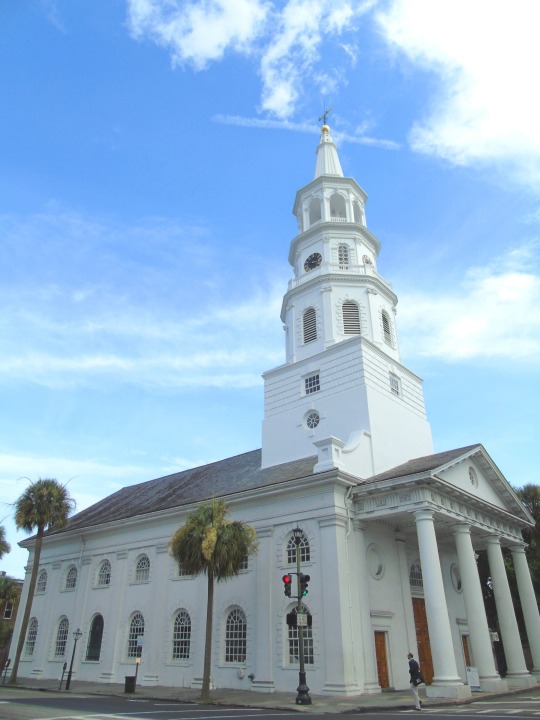

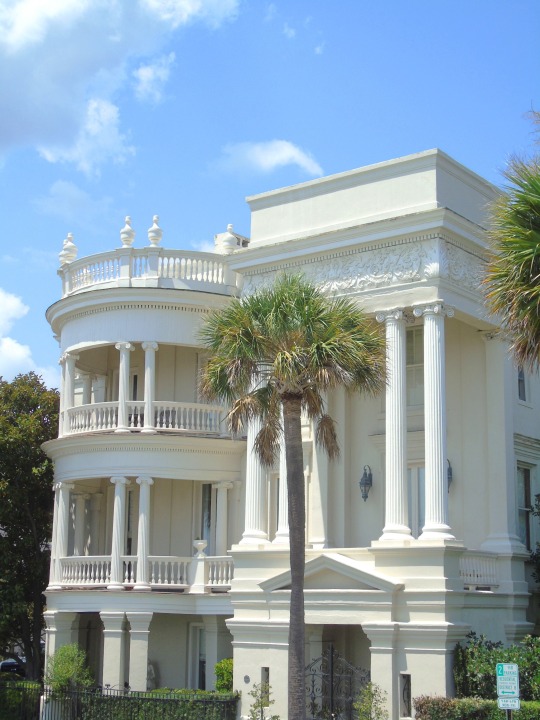
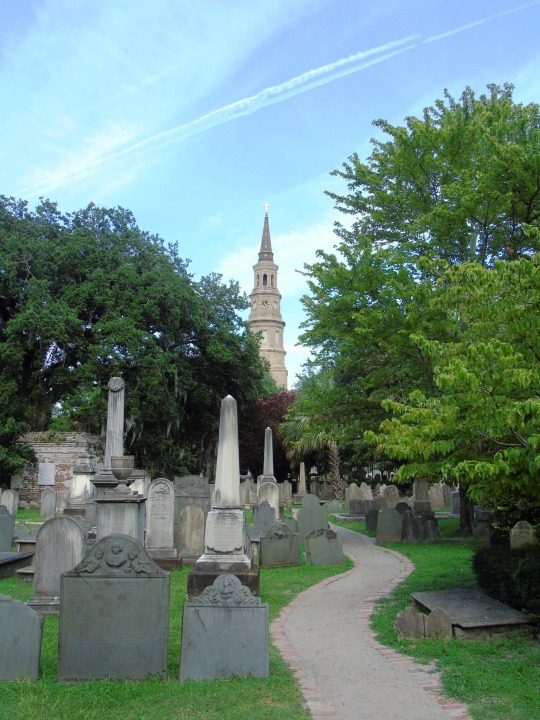
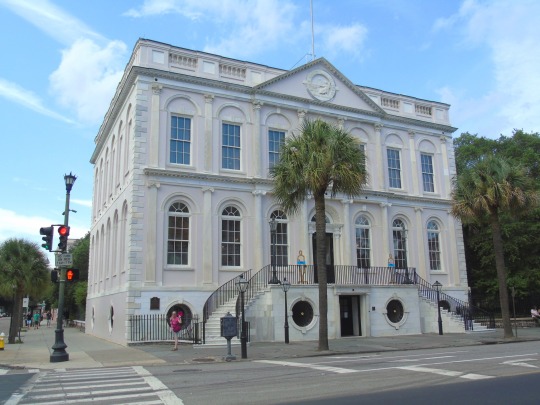

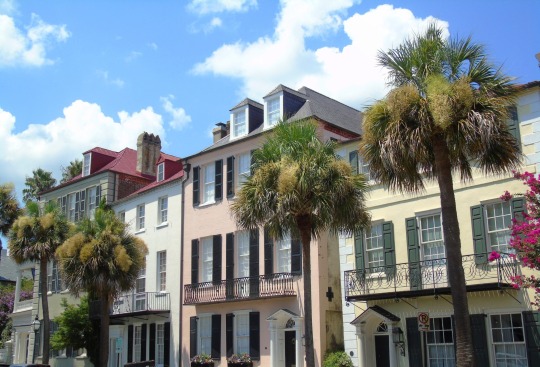
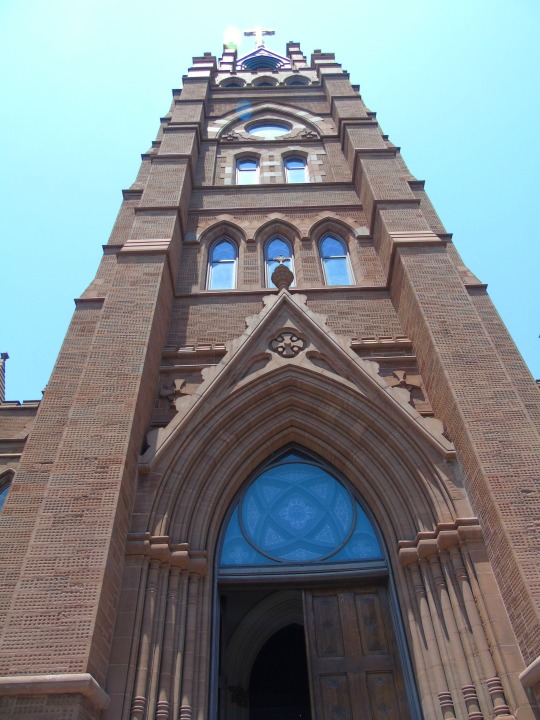
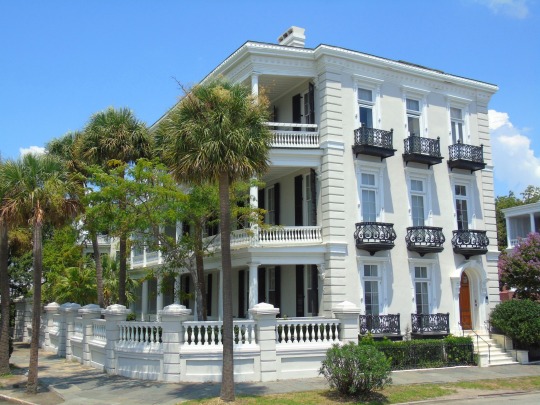
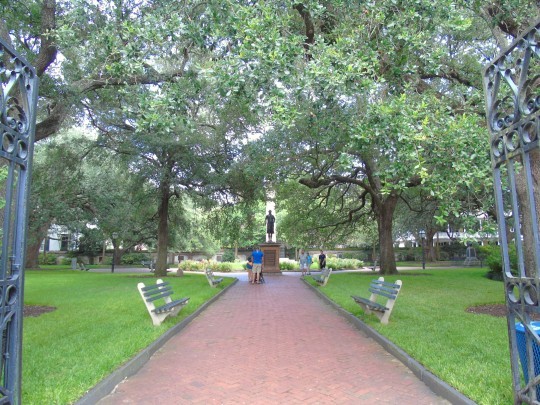
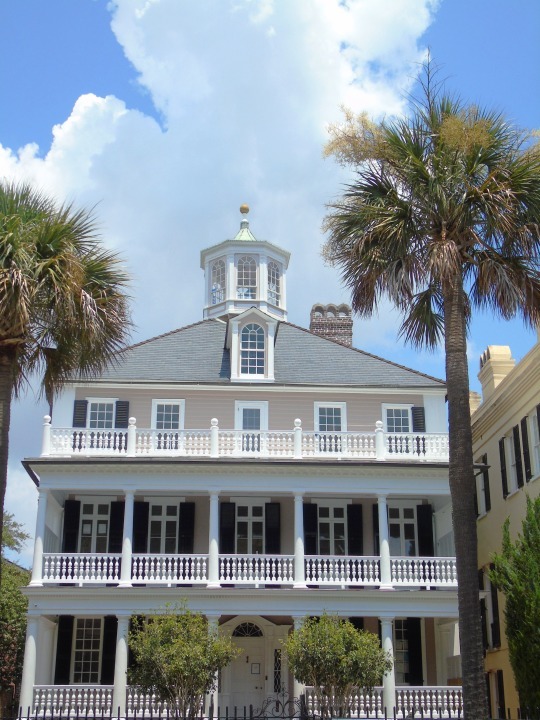
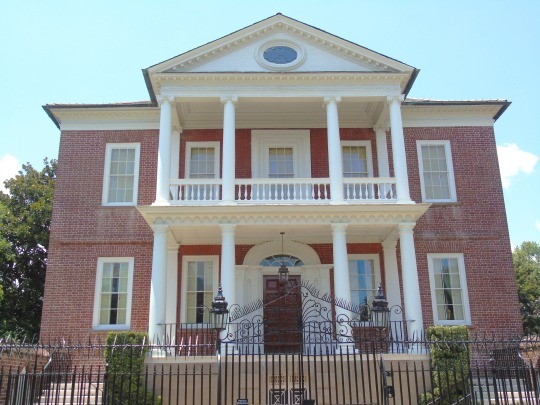
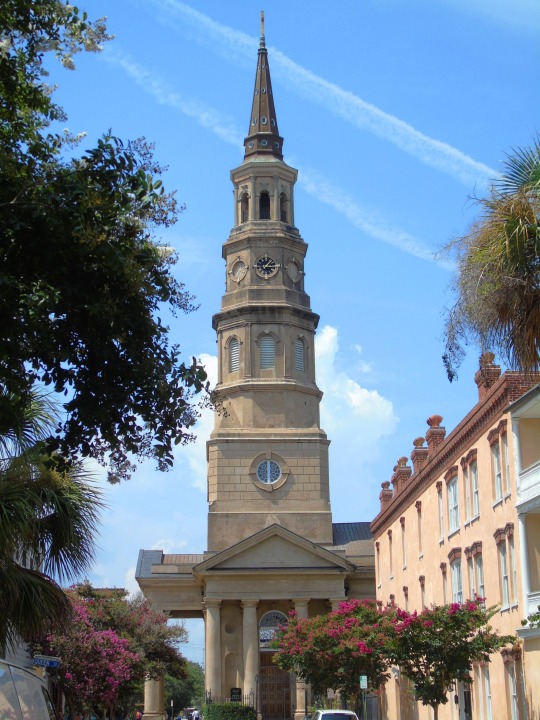

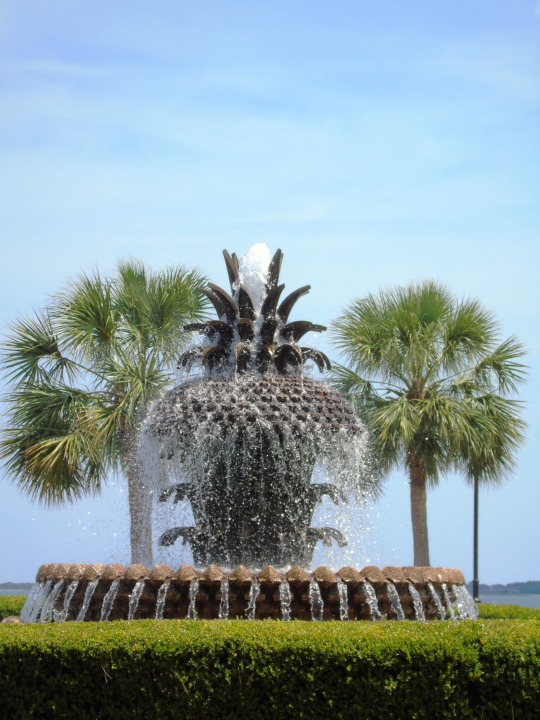
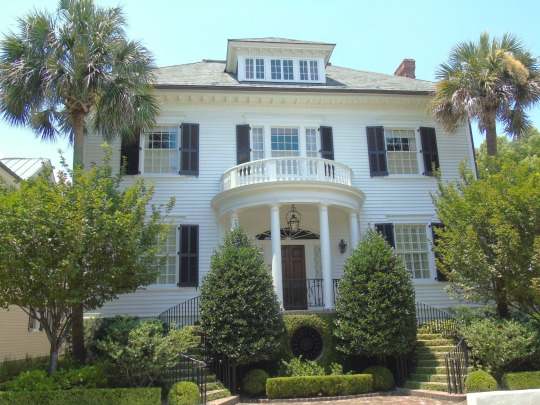

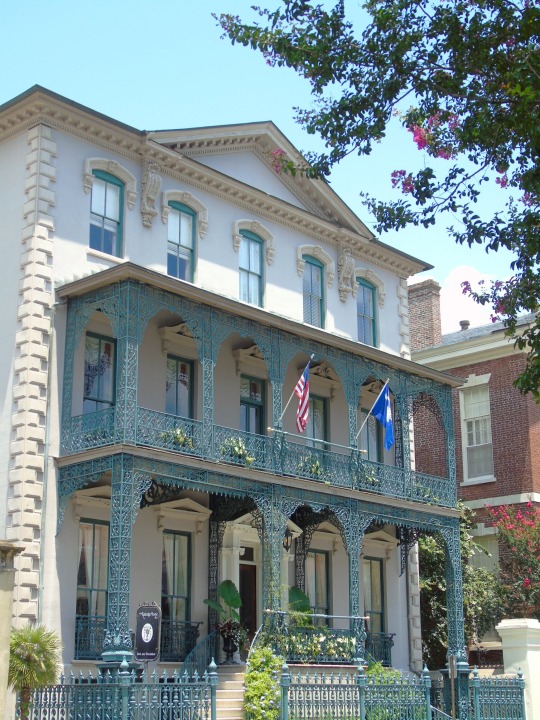
The American Revolutionary War officially ended with the liberation of Charleston on December 14, 1782.
#Louis DeSaussure House#Miles Brewton House#architecture#cityscape#USA#American Revolutionary War#American War of Independence#ended#14 December 1782#anniversary#US history#tourist attraction#landmark#city hall#Unitarian Church#St. Philips Church Episcopal West Cemetery#Cathedral of St John the Baptist#Col. John Ashe House#South Carolina#summer 2016#travel#original photography#vacation
3 notes
·
View notes
Text
i know this is the usamerican website but the shit ppl get away with saying here is so wild lol. i know everyone hates twitter but if i did see anything ignorant it'd only be through hundreds of non-americans dragging the corpse of the two-day old tweet through the streets. not saying u need to be put on blast publicly and be humbled but i think u need more exposure to non-americans to like. remember that we are human beings who are also going through the same shit as you. though mostly because your country did this to us too lol
#revolutionary army bills post would not have lasted 2 hours on south american twitter. and id be seated right at the brazilippine border#skl.txt
2 notes
·
View notes
Text
Story of the Tennessee Agricultural Museum
I love history and learning the story behind the story! Thanks to friend and tractor collector Buddy Woodson for the invite to the Spring-Crank Up 2024, antique tractor show. During our visit to the show, and Tennessee Agricultural Museum, Buddy gave me a tour of the grounds of the Tennessee Department of Agriculture. Since then, I have been diving deep, and learning about the history of this…

View On WordPress
#American Revolution#Andrew Ewing#Bank of Tennessee#Big Salt Springs#Buddy Woodson#Buford Ellington#cabins#Caldwell & Co.#Caldwell Bank#Caldwell Mansion#cattle#Cherokee#Chicasaw#Dr. Laura Guttormson#Ellington Agricultural Center#Farmall#French Lick#Gov. Ellington#history#horse barn#hosre racing#indigenous populations#J.P. Morgan of the South#land grants#Margaret Trousdale aldwell#Music#Nashville Tennessee#North Carolina#Oscar L. Farris#Revolutionary War
3 notes
·
View notes
Text
HAITI SOLIDARITY: A CONCERT & FUNDRAISER
OCTOBER 6, 2024 !!!!! Don’t miss this fantastic cultural evening, a fundraiser for the Haiti Emergency Relief Fund [HERF]. All funds to HERF go directly to support the grassroots struggle in Haiti. Also a book launch for Brassroots Democracy by Ben Barson. “Barson reveals a new revolutionary genealogy of jazz based in the popular struggles of Haiti, Mexico and the plantation regions of the…

View On WordPress
#"Barson reveals a new revolutionary genealogy of jazz based in the popular struggles of Haiti Mexico and the plantation regions of the#2024#600 thousand people fled their homes due to state sanctioned violence#African/Black experience#Afrikan#Avotcja#Ben Barson#Brassroots Democracy#culture#David Hardiman#food insecurity#Francis Wong#freedom#Genny Lim#Gizel Rodriguez#grassroots communities#grassroots women&039;s organizations#HAC#Haiti#Haiti Action Committee#Haiti Emergency Relief Fund#HERF#Kenya#literacy programs#Marcus Rediker#Mexico#mobile health clinics#news#October 6#plantation regions of the American South
1 note
·
View note
Text
Major General Nathaniel Greene and 1,000 Patriot soldiers try an assault on the important village of Ninety Six in the South Carolina hinterland during the American Revolutionary War. May 22, 1781.
Subscriber Content Add content here that will only be visible to your subscribers. Payment Image: Painting of Nathaniel Greene by Charles Willson Peale. (Public Domain) On this day in history, May 22, 1781, Major General Nathaniel Greene and 1,000 Patriot soldiers try an assault on the important village of Ninety Six in the South Carolina hinterland. After neglecting to capture the walled…

View On WordPress
#1700s#American Revolutionary War#and became the South’s most beloved living icon of the Civil War. Although he dedicated the rest of his life to upholding the memory of the#History Daily#Nathaniel Greene#South Carolina#war
0 notes
Text
The story of the Creek Nation in the Southern Gulf region from the revolutionary war to the 1790s.
#creek nation#creeks#1790s#revolutionary war#american revolution#2017#southern gulf#gulf of mexico#us south#southern us#indigenous people
0 notes
Text
In his seminal The Wretched of the Earth, Frantz Fanon could be writing about Gaza when he said: “In all armed struggles, there exists what we might call the point of no return. Almost always it is marked off by a huge and all-inclusive repression which engulfs all sectors of the colonial people.” In Israel, Gaza and the West Bank, that point has arrived. From Gaza to the Red Sea, on all fronts the West is now unmasked as a lawless killing machine in terror of losing control. Genocide, starvation and war, defended with Olympic-level diplomatic double-speak, are its only answers to the fact that the Global South, and the nations of the Middle East (if not their leaders) no longer wish to live under US hegemony. Jean-Paul Sartre, in his preface to Fanon's work, wrote of western colonialism: “Our Machiavellianism has little purchase on this wide-awake world that has run our falsehoods to earth one after the other. The settler has only recourse to one thing: brute force… the native has only one choice, between servitude and supremacy.” Fanon was a revolutionary thinker and a practising psychiatrist of colonial racism and its psychic impact on the colonised, and the coloniser. He and Sartre were writing about France’s imminent defeat in Algeria after seven years of brutal war. [...] Western powers are involved in conflicts thousands of miles from home, as they were in Fanon's time in Algeria, Congo and Indochina. Today the western political class has united behind Ukraine and Israel, but for millions of people it is no longer clear that the wars are worth fighting. As Yemen’s spokesman, Mohammed al-Bukhaiti, put it: “The war today is between Yemen which is struggling to stop the crimes of genocide, and the American and British coalition [who] support its perpetrators. Every party or individual in this world has two choices that have no thirds… who do you stand with as you watch these crimes?” Fanon, writing 63 years ago, agrees: “The colonial world is a Manichaean world… at times this Manichaeism goes to its logical conclusion and dehumanises the native, or to speak plainly, it turns him into an animal. The native is declared insensible to ethics; he represents not only the absence of values, but the negation of values… he is the enemy of values, and in this sense he is the absolute evil. “The native knows all this, and laughs to himself every time he spots an allusion to the animal world in the other’s words. For he knows he is not an animal, and it is precisely at the moment he realises his humanity that he begins to sharpen the weapons with which he will secure victory.”
. . . full article on MEE (1 Feb 2024)
You can also find a free copy of Fanon's The Wretched of the Earth on the Internet Archive (available as a PDF, EPUB etc.)
1K notes
·
View notes
Text
The South Carolina Historical Society puts on an annual winter lecture series, and the theme this year is "Untold Stories of the American Revolution." The first lecture of the series will be "Vicious and Immoral: Homosexuality, the American Revolution, and the Trials of Robert Newburgh" presented by John G. McCurdy on February 11, 2025. This lecture speaks right to my special interests, and I'm sure many of you would be interested in attending the lecture too. You can register for this lecture and other lectures in the series here (both in-person and livestream options available). Other lectures in the series include "The Tory's Wife: A Woman and Her Family in Revolutionary Carolina," "A Promised Land: Jewish Patriots, the American Revolution, and the Birth of Religious Freedom," and "Revolutionary Blacks: Discovering the Frank Brothers, Freeborn Men of Color, Soldiers of Independence." It's certainly a great lineup of topics and speakers this year!
Surprisingly, I had never heard of John McCurdy or his works prior to this lecture announcement. It appears that his lecture will be based on his recent book of the same name. I've just started reading the book myself and have been enjoying it so far. It is interesting and refreshing to see a discussion of queer history so specifically framed in the context of the American Revolution. John McCurdy previously talked about this book at the Museum of the American Revolution, and you can watch that presentation here. He has a few other publications, including a book titled Citizen Bachelors: Manhood and the Creation of the United States. I've picked this one up as well but haven't had the chance to read it yet. I'm certainly excited to have found some new books that discuss sexuality and gender in late 18th century America.
#Dr. McCurdy I would take every class on queer history + the American Revolution that you teach#He is also an openly gay man for those wondering#queer history#John McCurdy
167 notes
·
View notes
Text
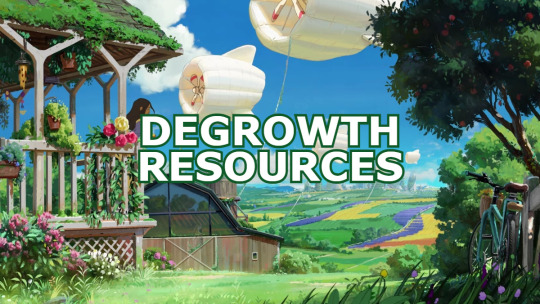
Degrowth basics
"The word degrowth stands for a family of political-economic approaches that, in the face of today’s accelerating planetary ecological crisis, reject unlimited, exponential economic growth as the definition of human progress."
What is Degrowth? | Caracol DSA
Why degrowth is the only responsible way forward | OpenDemocracy
Degrowth and MMT: A thought experiment
We Need A Fair Way To End Infinite Growth | Current Affairs
Degrowth: A Call for Radical Abundance | Common Dreams
Can degrowth save us and the planet? | Nottingham Trent
Defending limits is not Malthusian | Undisciplined Environments
Can We Have Prosperity Without Growth? | New Yorker
The Urgent Case for Shrinking the Economy | The New Republic
Giving Up on Economic Growth Could Make Us Cooler and Happier | The New Republic
A guide to degrowth: The movement prioritizing wellbeing in a bid to avoid climate cataclysm | CNBC
What is ‘degrowth’ and how can it fight climate change? | Popular Science
Enough for Everyone | Yes! Magazine
Toward a Post-Capitalist Future: On the Growth of “Degrowth” | Lit Hub
All we are saying is give degrowth a chance | The RSA
A pathway out of environmental collapse | newsroom
On Technology and Degrowth | Monthly Review
What is degrowth (and more importantly, what is it not)? | META
Green growth
"There is no empirical evidence that absolute decoupling from resource use can be achieved on a global scale against a background of continued economic growth."
Is Green Growth Possible? | Jason Hickel & Giorgos Kallis
The Myth of America’s Green Growth | Foreign Policy
The decoupling delusion: rethinking growth and sustainability | The Conversation
Is green growth happening? | Uneven Earth
Green Growth | Uneven Earth
The Delusion of Infinite Economic Growth | Scientific American
Degrowth is not austerity – it is actually just the opposite | Al Jazeera
A response to Paul Krugman: Growth is not as green as you might think | Timothée Parrique
Deceitful Decoupling: Misconceptions of a Persistent Myth | Alevgul H. Sorman
Degrowth isn’t the same as a recession – it’s an alternative to growing the economy forever | The Conversation
Degrowth and the left
"In the middle of an ecological emergency, should we be producing sport utility vehicles and mansions? Should we be diverting energy to support the obscene consumption and accumulation of the ruling class?"
The Left should embrace degrowth | New Internationalist
Ecosocialism is the Horizon, Degrowth is the Way | The Trouble
Degrowth: Socialism without Growth | Brave New Europe
Toward an Ecosocialist Degrowth: From the Materially Inevitable to the Socially Desirable | Monthly Review
For an Ecosocialist Degrowth | Monthly Review
Degrowth and Revolutionary Organizing | Rosa Luxemburg NYC
The necessity of ecosocialist degrowth | Rupture
Degrowth is Anti-Capitalist | Protean Mag
Degrowth Communism | PPPR (Part one | Part two | Part three)
Economic Planning and Degrowth: How Socialism Survives the 21st Century | New Socialist
Degrowth and the South
"Southern countries should be free to organize their resources and labor around meeting human needs rather than around servicing Northern growth."
Who is afraid of degrowth? A Global South economic perspective | IBON Foundation
The anti-colonial politics of degrowth | Jason Hickel
Unlearning: From Degrowth to Decolonization | Rosa Luxemburg NYC
Degrowth requires the Global South to default on its foreign debts | Resilience
Journals/Reports
Degrowth: a theory of radical abundance | Jason Hickel
A systematic review of the evidence on decoupling of GDP, resource use and GHG emissions, part II: synthesizing the insights
What does degrowth mean? A few points of clarification | Jason Hickel
Providing decent living with minimum energy: A global scenario | Global Environmental Change
Urgent need for post-growth climate mitigation scenarios | Nature Energy
Degrowth and critical agrarian studies | Julien-François Gerber
Decoupling debunked – Evidence and arguments against green growth as a sole strategy for sustainability | European Environmental Bureau
Incrementum ad Absurdum: Global Growth, Inequality and Poverty Eradication in a Carbon-Constrained World | David Woodward
Degrowth can work — here’s how science can help | Nature
A New Political Economy for a Healthy Planet | Jason Hickel
Planning beyond growth. The case for economic democracy within limits
Millionaire spending incompatible with 1.5 °C ambitions | Cleaner Production Letters
Is green growth happening? An empirical analysis of achieved versus Paris-compliant CO2–GDP decoupling in high-income countries | The Lancet
Books
Exploring Degrowth: A Critical Guide | Pluto Press
A People's Green New Deal | Max Ajl
Less is More: How Degrowth Will Save the World | Jason Hickel
Breaking Things at Work: The Luddites Are Right About Why You Hate Your Job | Verso Books
The Future is Degrowth: A Guide to a World Beyond Capitalism | Verso Books
The Imperial Mode of Living: Everyday Life and the Ecological Crisis of Capitalism | Verso Books
Marx in the Anthropocene: Towards the Idea of Degrowth Communism | Kohei Saito
Degrowth & Strategy: how to bring about social-ecological transformation
27 Essays and Thoughts on Degrowth | Giorgos Kallis
Videos
Yes To Limits To Growth! | The Other School
How Degrowth Can Save the World | Andrewism
How We End Consumerism | Our Changing Climate
Demystifying Degrowth | Rosa Luxemburg NYC
Degrowth is not Austerity | John the Duncan
Degrowth and Ecosocialism | Planet: Critical
Degrowth in 7 minutes: Fighting for climate by living better | Think That Through
The Future is Degrowth (w/ Aaron Vansintjan) || SRSLY WRONG
"Degrowth means power to the working class!"with Jason Hickel | GND Media
Others
degrowth.info
Degrowth Journal
Doughnut Economics
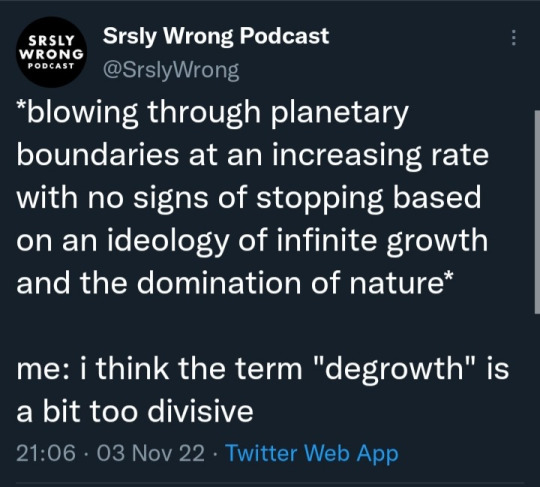
3K notes
·
View notes
Text

There are some on the right, the pro-fascist side, who would claim Dems, liberals are the establishment.
First I would like to start out with the definition of liberal. Liberal: Willing to listen to, or accept ideas and opinions different from one’s own. Open minded.
Now let’s take a loo at conservative. Conservative: Adverse to change or innovation. Holding to “traditional” values.
When one thinks of movements that have bettered humanity, and the world at large are these done in the name of tradition? Are these done by the ideals of old?
Tradition in this country can be rooted back to slavery, back to a time when white people lorded their superiority over others based solely on the color of their skin. It can be traced back to the most wealthy among us, exploiting workers to enrich themselves with as much as possible while no care is given for the health and safety of those who make their wealth possible. Tradition can be traced back to voter suppression and Jim Crow laws, disenfranchising the votes of those who don’t fit their socioeconomic standards, who don’t fit their color code.
This tradition can be traced back to TODAY! Because this tradition of disenfranchisement is happening TODAY! Nearly every state with a GOP majority has done, and is doing all it can to drop voters off the roles. Pretending there’s some kind of fraud. This fraud is simply the poor, those of color, and those who don’t fit a white Christian mold, that they seem to think this country is.
Through years of scheming and planning, through a lack of foresight from our founding fathers, trying to appease slave states. The GOP has found a way of minority rule over the vastly diverse country America is. This minoritarian rule can be seen clearly in SCOTUS, it can be seen in the senate where millions and millions of Americans have little to no say on the goings on in government. Wyoming, North Dakota, South Dakota, Montana, Idaho, all those states combined don’t have the number of citizens California does. All those states are “conservative” states, but California gets 2 representatives, the collective there is 10! A 10-2 vote with not nearly as many constituents. There’s the house though!? Some may argue. The house is a joke! So gerrymandered, useless idiots like Margery toilet Greene will keep her seat for decades to come. We outnumber conservatives in the real world but are trampled by them in representation.
We are the revolutionaries! We are the fight against the forces of old and evil! We are the fight for change! For a better America, for a better world where ALL have equal rights! Where ALL get the same shot at the American dream! Where ALL are treated as members of this country despite their origins or preferences or religion! We are the rebellion against “tradition”. A tradition that seeks to benefit one sect of peoples. We are the other sect and we will not be gaslit to think otherwise.
All of us in the pro-democracy movement are the heart of this nation. The liberals who will take the pinnacle of diversity and thrive with the ideas of all! We are the change. We are the next generation. We are love! We are hope! We are the open minded, accepting, tolerant, compassionate, ever learning, ever growing liberals of the United States of America.
#election 2024#politics#vote blue#kamala harris#news#traitor trump#donald trump#republicans#the left#gop#free speech#freedom#fascisim#trump is a threat to democracy#declaration of independence#democrats#democracy#harris waltz#harris walz 2024#pearl harbor#trump24#fuck trump#trump is a traitor#kamala for president#kamala 2024#vote kamala#american people#liberals#the statue of liberty#liberty
206 notes
·
View notes
Text






























American Revolutionary War: In the largest defeat of the Continental Army, Charleston is taken by British forces on May 12, 1780.
#American Revolutionary War#Charleston#taken by British forces#12 May 1780#anniversary#US history#St. Philip's Episcopal Church#St. Philip's Episcopal Church cemetery#Charleston City Hall#cityscape#street scene#Architecture#St. Philips Church Episcopal West Cemetery#travel#South Carolina#USA#summer 2016#Louis DeSaussure House#landmark#South Battery Street#Miles Brewton House#original photography#vacation#tourist attraction
2 notes
·
View notes
Text
This was intended to be an essay about chivalry—its history, its uses, its various incarnations—medieval violence, the Romantic reinterpretation, the ideal of chivalry in the American South and its attendant lynch mobs. I would have talked about the chivalric triad: Knight, Innocent, Enemy—the way the Innocent serves as a fulcrum for the Knight to enact violence against the Enemy—the iterations of this triad in any number of places in our society, from the so-called sheepdog mentality trained into our police to the legion of revenge-fantasy Taken clones. I would have talked about the way Kierkegaard in Fear and Trembling incorporates chivalry with the sacrifice of Isaac, the theology of self-justified suffering that comes from that. I would have talked at some length about various portrayals of lesbian chivalry in media—Revolutionary Girl Utena, the Locked Tomb books, Signalis—how they use it, what they say about it, and whether at the end there is anything worth salvaging from this intrinsically violent way of relating to the world, to others, to oneself, to God.
I think a version of that essay might still be worth writing someday, but right now, there's something I need to talk about much more urgently. Right now, there's something I suspect you might desperately need to hear. Today I'm going to talk about Godzilla.
GODZILLA SAVED MY LIFE: A Polemic
Godzilla Minus One (2024) takes place in Japan in the immediate aftermath of the Second World War. Its protagonist, Koichi, is a failed kamikaze pilot who in the opening scenes is repeatedly excoriated for his cowardice and dereliction of duty. When he returns home to a bombed and desolate Tokyo, his bereaved neighbor tells him, if people like you had done their duty, this would not have happened. The film spends the rest of its runtime doggedly refuting this idea. It says, out loud, that the relentless calculus of sacrifice that turns men into things to be spent has no place in this world, that it is needless and cruel. It is not subtle about this point. It is not trying to be.
I saw this movie in its black and white version in theaters in February, on the last day of its run. Its version of Godzilla inspires in me both terror and near-religious awe. It looms over the film, an echo both of the devastation of the war and of Koichi's guilt and shame, its presence inviting—demanding—the final consummation of the mission he abandoned.
I wept in that theater. I gripped my friend's hand and I sobbed. This is unlike me (unless I'm watching Gunbuster), and it took four days for me to work out why this Godzilla movie had affected me so profoundly.
arkansas kamikaze
and she looked, and behold! a beast rose from the sea, and against the beast he breathed glory in a Zero dive. his beatified smile shone from the wreck of the Little Rock Planned Parenthood clinic. and a great wind blew out of heaven, and she woke
and made breakfast, and watched her son wholly absorbed in Bonhoeffer, found her lipstick worn down to the nub for practice stigmata, and saw for a moment the dove descending, the tongue of fire over his head.
The thing about being raised in a right-wing fundamentalist family is that you are from birth being prepared to be a weapon, or a martyr, and there is really no difference between those two things. If my mother had had her way, I would have gone to a tiny far-right college and studied law for the sole and explicit purpose of getting Roe v. Wade overturned. She would, I believe, have settled for me bombing an abortion clinic. Certainly it would have been easier for her to reconcile with that than with what I became instead.
The other thing about being raised in a right-wing fundamentalist family is, some things stick. And it's very hard to notice, as your beliefs and values and identity undergo radical changes, that there is still a whisper in you that believes in the power of the glorious death, of the ultimate virtue of strapping explosives to your chest and walking into the halls of the Enemy. And when you feel helpless, when you watch systems and institutions that ought to prevent atrocities instead encourage them, that whisper grows louder and louder and louder.
Watching Koichi fly his last mission, watching him an instant before impact eject, and live—watching everyone live through the final confrontation because they had all rejected the calculus of sacrifice—allowed me to see also for the very first time this parasitic idea that had grown coiled inside me since infancy, allowed me to see where it had come from, its whole monstrous lineage, and then it allowed me to take hold of it and pull it out.
Twenty days later, Aaron Bushnell set himself on fire outside the Israeli embassy in Washington, DC, in protest of the still-ongoing genocide of the Palestinian people. He was, like me, raised in a right-wing fundamentalist environment. He was, like one of my siblings, a member of the US Armed Forces radicalized by his experiences and his own conscience. People called him a hero and martyr—on this very site, in responses to the excellent Crimethinc piece circulating at the time, I saw people saying they felt like they should follow suit (even though the article in question explicitly and repeatedly warned against it!) As if the loss of a person of conscience and conviction could be anything other than a tragedy, as if anyone in power choosing to support the genocide could regard the death of one of their own soldiers as anything other than what soldiers are for, as if the moral response to a genocide could ever be to add another corpse to the mountain—and still I saw people lionizing him, praising his courage and his sacrifice, all but telling people to follow in his footsteps.
No. Aaron Bushnell was a suicide. He lived his whole life within organizations that taught him that he could purchase more with his death than he could ever accomplish with his life, and while we may praise his conscience, we can only mourn his loss and the grievous error that led him to it.
This is the thing about learning to see this parasite: you begin to see it everywhere. Our history for millennia is awash with human sacrifice: Abraham and Isaac, Jephthah and his nameless daughter, Agamemnon and Iphigenia, the crucifixion of Jesus—and later, litanies, row upon row of dead saints, stories of glorious last stands. The courageous martyred dead: blood and corpses, only and always, to Moloch.
In light of the recent US election, perhaps many of my American readers are feeling shock or horror or despair. I understand, and without blame, with love and gentleness, I tell you that this is because you have not correctly understood the scope of the problem. You imagine a discontinuity between the liberal version of American capitalism and imperialism and the fascist version of the same. No such discontinuity exists. Things will no doubt be different for us here in the US than they would otherwise be, and probably worse, but there is no distinction to be made between the genocide of yesterday and the genocide of tomorrow. The enemy is the same. The work is the same.
Above all else, this is to warn you: when you do this work, when you look for a place you can put your shoulder to the wheel, there will be people who want to spend their lives—or yours—like coin to purchase some great change immediately. Perhaps they mean well, and helplessness and desperation drives them to act without regard for the consequences. Perhaps they do not mean well. Do not follow these people. Perhaps they merely expect you to go to prison, and have no plan for how to support you after that. This is barely different. It is far better for you to languish in useless liberal nonprofits which will accomplish nothing of value than to attempt radical direct action with people with correct politics and no forethought, and end up dead or imprisoned—but these are not the only two options. Aaron Bushnell cannot ever again do anything for anyone. You can.
This is as much as I know for certain. I love you. Don't die.
-------
End Notes
It would not be unreasonable to ask me, in light of what I've said here about martyrdom, what I think of it in other cultural contexts, especially since a similar word is often used to refer to e.g. Palestinian people murdered by Israeli soldiers. The answer is nothing at all. Such people get to use whatever words they want to salvage whatever meaning and comfort they can.
Godzilla Minus One, as effective a movie as it is, was not solely responsible for the scales falling from my eyes. It was an important part of the process, but I doubt it would have sufficed on its own were I not in community with people I trust and talk to about such things. "Godzilla and also my trusted friends saved my life" is, alas, a worse title.
There will be a part two to this. Part one seemed more urgent.
203 notes
·
View notes
Text
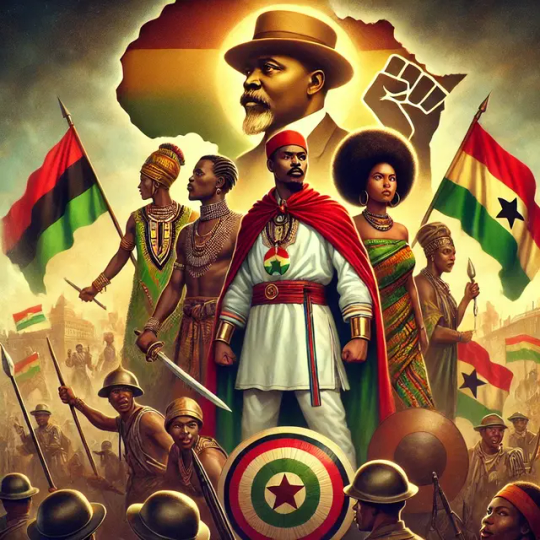
African Resistance Movements Against Colonialism: A Garveyite Perspective
“Rise Up, Ye Mighty Race!”—The Spirit of Resistance and Liberation
Introduction: The Garveyite Lens on African Resistance
Marcus Garvey, the great Pan-Africanist and leader of the Universal Negro Improvement Association (UNIA), championed African self-determination, unity, and economic independence. His teachings emphasized that colonial rule was not merely a political imposition but a spiritual and economic stranglehold that sought to erase African sovereignty and dignity.
From a Garveyite perspective, African resistance to colonialism was not just about territorial control—it was about reclaiming African identity, self-sufficiency, and the destiny of the Black race. The heroes of these movements were not just warriors but visionaries who embodied Garvey’s call: “Africa for the Africans, those at home and those abroad!”
1. Early Resistance: Fighting for Ancestral Lands and Autonomy
Before European colonization took full control, African kingdoms and societies fiercely resisted foreign domination. Many of these struggles were aligned with Garvey’s ideals of self-reliance and strong leadership.
The Ashanti Wars (1823–1900, Ghana): The Ashanti Empire, led by rulers such as Asantehene Prempeh I and Queen Yaa Asantewaa, waged multiple wars against the British. Yaa Asantewaa’s leadership in the 1900 War of the Golden Stool exemplified the defiant spirit Garvey championed: African women and men leading their own struggles, refusing foreign rule.
The Zulu Resistance (1879, South Africa): Under King Cetshwayo, the Zulu military defeated British forces at the Battle of Isandlwana, a powerful example of African strategic brilliance. Garvey would have seen this as proof that African people, when united, could stand against European imperial forces.
The Maji Maji Rebellion (1905–1907, Tanzania): A widespread uprising against German rule, where different ethnic groups united under spiritual leadership. It echoed Garvey’s belief in unity as the key to liberation.
These wars proved that Africa was never passively colonized. The struggle for sovereignty was present from the beginning.
2. Pan-Africanism and the Rise of Organized Resistance
As colonial rule tightened, African resistance evolved into more structured political movements. This shift aligned with Garvey’s vision of a global African awakening.
The Ethiopian Resistance (1935–1941): Emperor Haile Selassie’s defiance against Mussolini’s invasion of Ethiopia was a monumental moment for Pan-Africanists worldwide. Garvey saw Ethiopia as a symbol of unbroken African sovereignty, and Selassie’s resistance was a rallying cry for Black liberation worldwide.
The Mau Mau Uprising (1952–1960, Kenya): The Kikuyu-led Mau Mau rebellion against British rule was one of the most militant anti-colonial struggles. It embodied Garvey’s call for Africans to seize their freedom by any means necessary.
The Liberation of Ghana (1957): Kwame Nkrumah’s leadership in achieving Ghanaian independence was a direct continuation of Garvey’s ideals. Nkrumah, deeply influenced by Garveyism, declared: “The independence of Ghana is meaningless unless it is linked up with the total liberation of the African continent.”
These movements reflected Garvey’s belief that African unity and self-determination were inevitable forces that colonial powers could not suppress forever.
3. The Role of African Diaspora and Garvey’s Influence
Garveyism was not just a philosophy—it was a movement that connected the struggles of Africans on the continent with those in the diaspora.
Caribbean and American Influence on African Liberation: Many African revolutionaries were inspired by Pan-Africanist movements in the Caribbean and the U.S. Leaders like Jomo Kenyatta (Kenya), Julius Nyerere (Tanzania), and Nkrumah (Ghana) studied abroad, where they encountered Garvey’s teachings and applied them to their home struggles.
UNIA’s Impact on Black Consciousness: Garvey’s UNIA spread ideas of African nationalism, economic self-reliance, and military resistance. His vision of a self-sufficient Africa influenced independence leaders and fueled anti-colonial activism.
The Back-to-Africa Movement: While most Africans did not physically return to Africa, Garvey’s message inspired a psychological return—one that led to a reconnection with African identity, history, and the fight for sovereignty.
The African resistance movements were never isolated struggles. They were part of a global Black awakening, demanding not just freedom from colonial rule but also a reclamation of dignity and economic power.
4. Lessons from Garvey for Today’s Africa
Garvey’s vision remains as relevant today as it was during colonial rule. As Africa continues to navigate neocolonialism—economic exploitation, foreign influence, and internal divisions—the core Garveyite principles remain essential:
Economic Self-Reliance: True liberation means controlling resources, industries, and trade. Modern African nations must prioritize building strong, independent economies rather than relying on foreign aid.
Pan-African Unity: Colonial borders divided Africa, but unity remains the key to true independence. Regional alliances like the African Union must embrace Garvey’s radical call for continental solidarity.
Cultural Reclamation: Garvey understood that mental liberation was as crucial as political liberation. Africa must continue reclaiming its history, languages, and cultural pride to fully escape the psychological chains of colonialism.
Conclusion: The Struggle Continues
Garvey’s cry—"Up, you mighty race, accomplish what you will!"—remains a guiding light. The resistance against colonialism was never just about defeating European powers; it was about the restoration of African sovereignty, pride, and unity. The struggle continues today in economic policies, cultural narratives, and the fight against neo-colonial forces.
Garveyite thought reminds us that true liberation is not just about removing the colonizer’s physical presence—it’s about ensuring that Africa stands tall, self-sufficient, and united in its destiny.
Africa for the Africans—Yesterday, Today, and Forever!
#african resistance#black resistance#black history#black people#blacktumblr#black#black tumblr#pan africanism#black conscious#africa#black empowering#black power#blog#marcus garvey#Garveyism#Garveyite#decolonization#black liberation#african history
80 notes
·
View notes
Text
Some 19th century rusameamerus hcs!! (゜o゜;) and a little comic (◕ᴗ◕✿)
Today, I will skip over the entire revolutionary war+whatever happened in the world in 1812, and we are nearing the 1820s. Um, no, actually over 1825... Cause in 1822 there is Monroe's doctrine with the whole "you don't mess with my stuff, I don't mess with yours,” a hands-off policy in South America, as a reaction to plans of the Holy Alliance (Austria, Prussia, Russia) to discuss matters at the Congress of Verona on the Spanish question. Like they wanted to restore Spanish rule over Latin American colonies that had declared their independence. AnOpinions of the former 13 colonies were not asked. The USA might have plans for LatAme, how could they??????!!!!!
Okay, I'll stop with the historical stuff. I got sidetracked. Sometimes I start to act like Philomena Cunk…

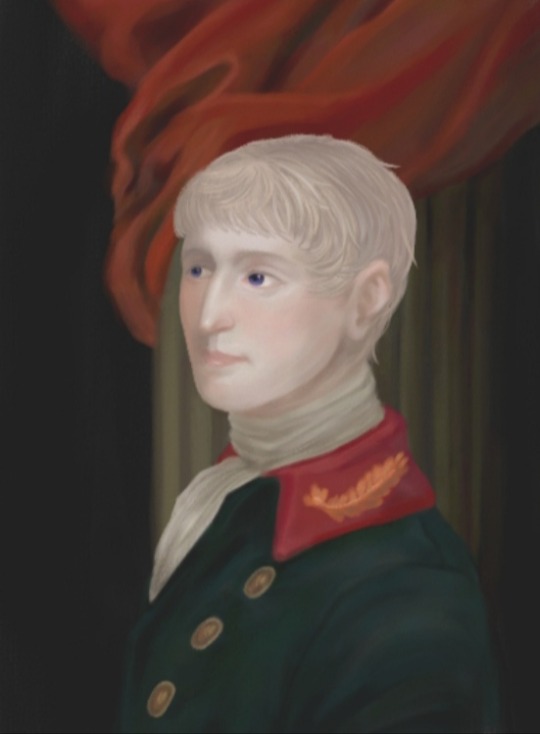
The portraits are in the appropriate style of grand manner for 18/19 century. Highly referenced Joshua Reynolds. They're unfinished cause I got bored. Sorry! (˘・_・˘)
Anywho
Al and Ivan knew each other in the first half of the 19th century. They met and interacted; some points of friendship were gained. This is established, at least in my interpretation. After many times of proving his independence, Alfred is still being isolated by the Old World. Like they're aware of his existence and literally don't give a fuck about it. Many other things are happening on the continent; no time for new acquaintances. However, America wants to be included and to have friends!! So he is still stuck with his "sort of not fully an ally in independence war cause yknow we don't want the british to consider us as enemies too, so here are two ships if the shit hits the fan - use them" Ivan. A close neighbour from the north who started doing... something? in the icy part of the land (expansion, colonial adventure in Alaska). A BIG imperial monarchy with a good position in the Concert of Europe. Someone who probably knows a lot about diplomacy and other things on how to exist as a whole country. On the other hand, Russia isn't reluctant to have a nosy and too energetic creature around; of course, he is excited about a new friend. They see benefits in each other—"the whole world will open for me/I won't feel so lonely with him". Almost compatible with problems. This was probably curiosity at first sight. Major "why is that with him this way and not the other?" factor.
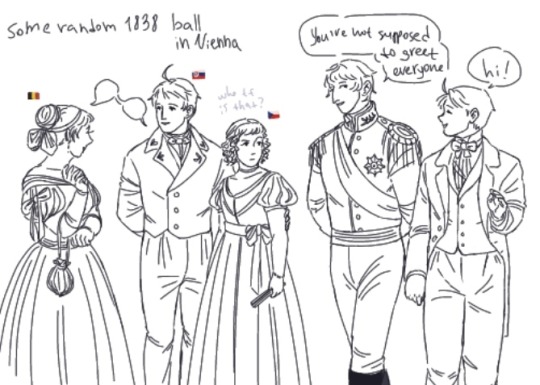
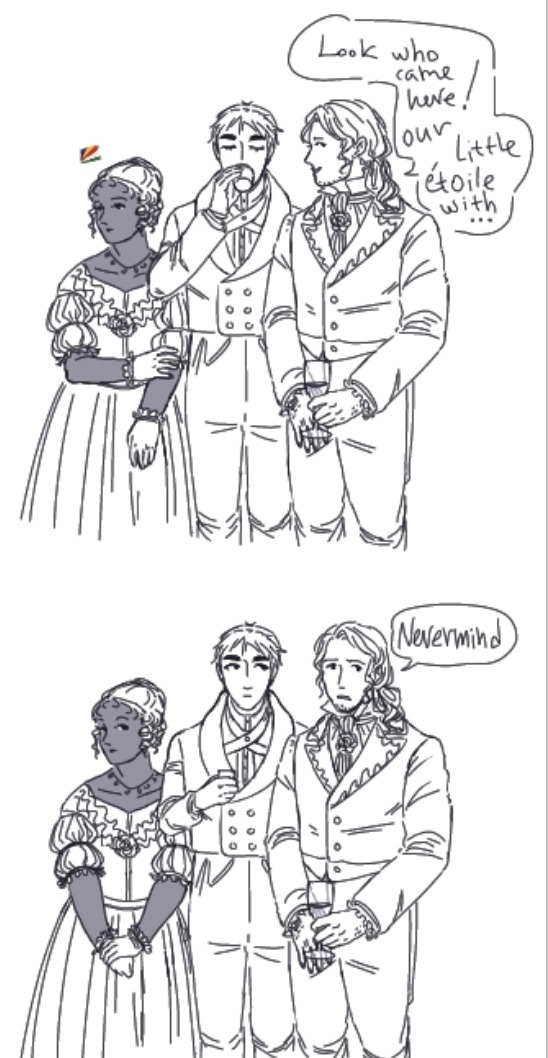
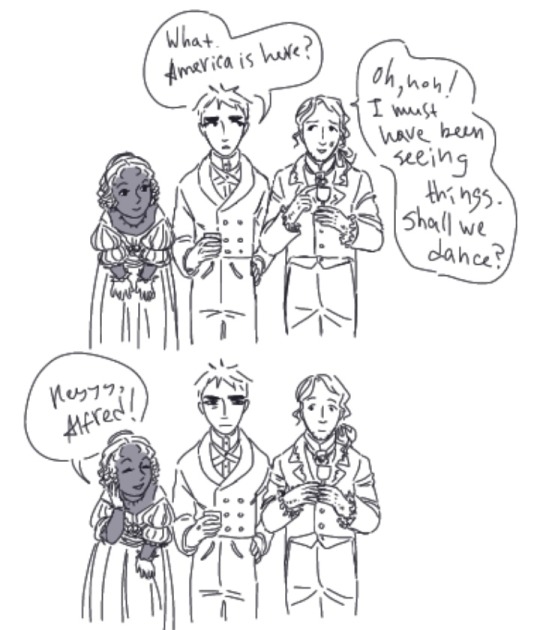
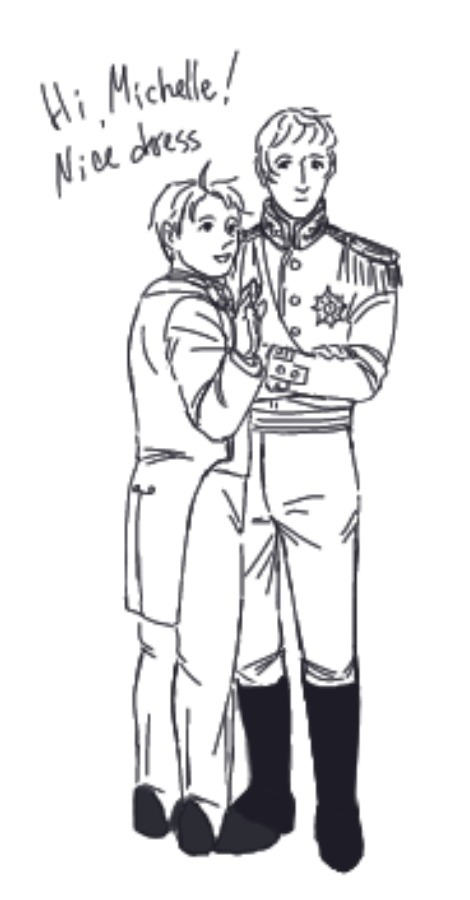
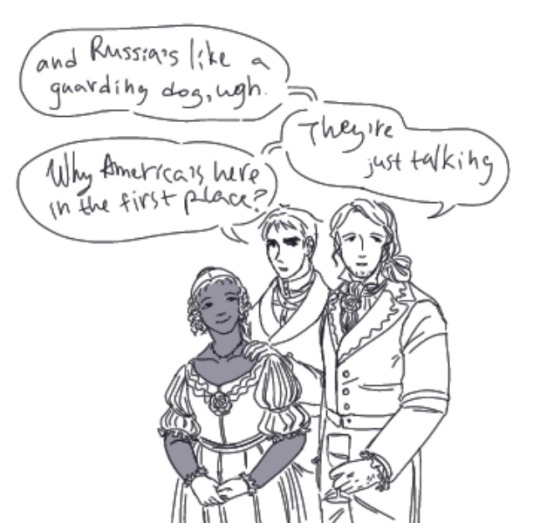
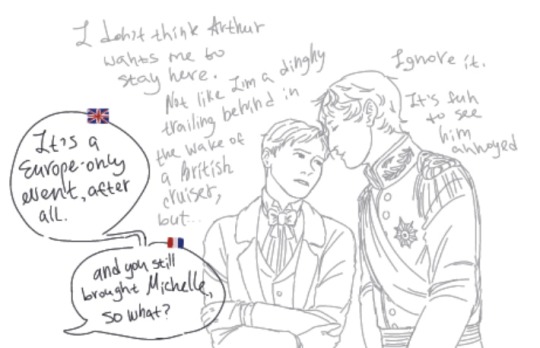
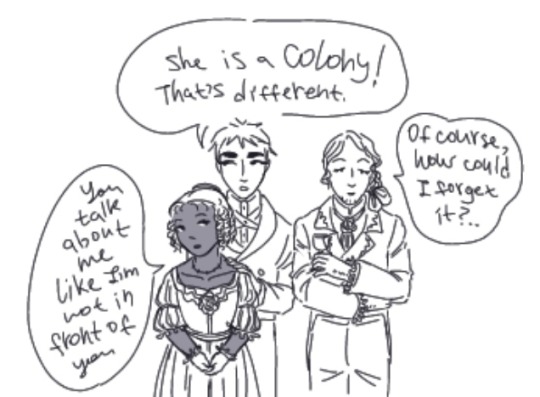
A hot new bombshell has entered the villa
The next bit might come across as too metaphorical and OOC. You've been warned.
Ivan sees Alfred (at least until the 1850s) as too nice, too innocent, and an overall pure being. A boy is so full of wonder and love for everything that it feels almost impossible. Ivan doesn't want that to change and is actually afraid of it happening, he tries to hold back Alfred from seeing the other harsh side of reality; nevertheless, Al wants to experience all - dirt, bliss, the world as whole. He doesn't want to be brought back to life, isolated from others.
After the 1850s, the situation changed. Ivan really appreciated Alfred's benevolent neutrality with the mess the Crimean War was; there is no secret in that. As a way of showing gratitude for it, he started inviting Alfred more frequently to his place. For tea, for hunts or even without a proper reason [yeah, it takes like a month to sail from one continent to another, inconvenient!]. And Alfred crushed. Real hard (regular oh, italicized oh). No other nation was treating him like that—"humanly". Everyone wanted something from him and wished for him to somehow change in a direction that was more beneficial for them. For Ivan, Alfred, as he was, was more than enough. America knew that he appreciated Ivan way before, but didn't give much thought to his feelings. He was capable of some sort of controlling it. However, now [as in the second half of the 19th century] Alfred cannot. He sighs too loud, looks too long, and smiles too much. Everything feels too much for him to handle. He tries to distract himself and pays attention to making new friends (cough the opening of Japan in 1853-1855 cough), but is still drawn to Ivan. However, the latter doesn't understand why America is suddenly more jumpy, more uneasy with him, and why his laughs are more strained. Although Alfred insists that everything is just peachy (he doesn't want to ruin this friendship with his weird feelings), Ivan's suspicion grows. He wants to know why but can't come up with a solution.
Their already interesting liaison transforms into more confusion.
And I consider hetamyu canon (cause musicals fill in all the missing plot points in manga, for me at least), sooo according to the second one, there was something peculiar between them (the infamous kiss scene).
Although I headcanon, at least for half of the 19th century, their friendship was childlike and mostly naïve. Ivan and Alfred are tall kids in diff ways. And I can absolutely imagine them playing tag or hide and seek. Though, this could have happened in any century.
In 1861-1865 they couldn't physically see each other (Alfred had to crawl in trenches), so their usual correspondence intensified (that sort of "absolutely not gay in any way" messages, like "my heart aches at the thought of your suffering, my dearest friend")...
Except for the late autumn of 1863 [the visit of the Russian fleet during the fall-winter of 1863-1864*]. Ivan paid for the first time in a while for a visit to New York (I like to think that Alfred stayed a lot of times in Saint Petersburg; however, Ivan wasn't that fond of travelling). Alfred was tired and pretty much beaten from fighting with himself; however, some obsessed excitement brought back his optimism for one night. At the ball they, as expected, danced a bit, and escaped to a more enclosed space from people and noise. Not much talking happened there; soothing silence at that time was needed. Of course Alfred was stressed because your own family literally wants to dismember you (don't know if I need to put a historical reference, but still—at the outset of the war, England and France supported the South. Napoleon III, with colonial designs on Mexico [Second Franco-Mexican War, 1861-1867], looked longingly on a divided United States, and British shipping interests were seriously affected by Lincoln's blockade of southern US ports, which led to the recognition of the Confederate states as belligerents. Russia supported the Union).
*I wanted to add here an actual fun historical fact! This “gesture” was interpreted by Americans as sympathetical move and overall a sign of “secret agreement” and Russia's protection of US Government (you can read about it further here: https://www.jstor.org/stable/25156012)
Not long after that, Ivan started viewing Alfred as more mature than he was before (Ame literally got torn apart in the Civil War, of course he boosted in character development).
I'll stop here (◡ ω ◡)
(They were literally bros before hoes....................)
I'll think about making other additions to this long list of headcanons about the start of the 19th century and, of course, the whole selling Alaska event.
For finishing reading this scientific paper-sized post, you'll get old sketches of Al (and Matt!!! Woah!!) in Victorian clothing.
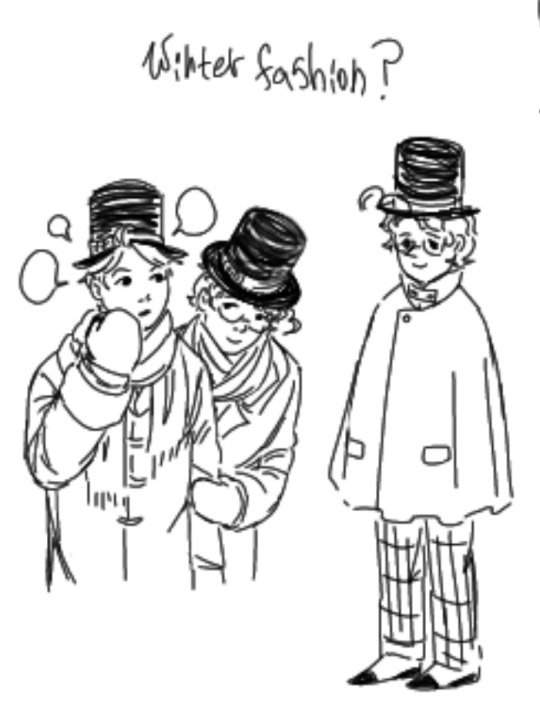
trench coat buttoned to the TOP.
#hetalia#amerus#rusame#hws#aph#hws america#hws russia#aph america#aph russia#i hope you will grow to enjoy my papyrus scrolls#art#headcanon#and i didn't even try to include all historical refs hahah....#you guessed right - 19th century is one of my fav periods#I know the portraits don't look decent but I wasted on them a lot of time so I kind of had to include them#i hate drawing in realism PERIOD it's too much to think my brain is weak#but it speaks to me like the green goblin mask
71 notes
·
View notes
Text
A quick alternate history scenario I made for the r/AlternateHistory subreddit:

In 1796, George Washington reluctantly runs for a third term as president to prevent Jefferson and the Democratic-Republicans from taking hold of government. His third and final term is more rocky than the first two, with the south being especially unhappy with some of his reforms, though they associate them with his vice-president John Adams and Secretary of State Alexander Hamilton. On December 14th, 1799, George Washington dies in office. The nation is in turmoil and mourning. The Democratic-Republicans call for a special election, but vice-president John Adams is declared president instead. On Christmas 1799 a protest march on DC turns violent when federal forces clash with protestors and revolutionary war veterans. Jefferson declares Adams an illegitimate usurper. Adams calls off next year's election. Several state legislatures , especially in the South, declare Jefferson as a provisional emergency leader for the purpose of ousting the Federalist regime. The American Civil War has begun. On January 15, with DC about to be overtaken, an internal vote within the Federalist war cabinet decide to oust Adams and appoint his vice president and war hero Alexander Hamilton as president instead. The tide of the war turns, with the Federalist forces able to protect the north and much of their territory, but it is short lived. The Federalist are forced to abandon DC on April and retreat to New York City as a provisional capital. Hamilton himself refuses to go. He is captured by the Democratic-Republicans along with Adams. Jefferson is appointed president on April 19th. In July, Senator Gouverneur Morris is appointed as temporary leader of the Federalist forces in New York. The war stalls for several months as the Democratic-Republican forces fail to make inroads into the north. Meanwhile Jefferson's administration is poorly received and he is compared poorly to the Reign of Terror in France, especially after the public executions of Adams and Hamilton, and after the French Revolutionary government acknowledges him as the legitimate president. The British back Morris and the Federalists and provide military assistance in return for territorial concessions out west. Despite the Democratic-Republicans trying to paint Morris as a traitor for his British support, the public hates Jefferson more, compounded by a series of military defeats. On December 14th, during a public memorial service for the 1 year anniversary of Washington's death, Jefferson presents himself as the true heir to the venerated general. This creates outrage and leads to a 6 days siege of the White House, at the end of which Jefferson is dragged out and beaten to death by the public and some of his own soldiers. The Democratic-Republican forces subsequently surrender and the capital is captured by Federalist and British forces. Morris is appointed president and his first act is to call in a new Constitutional Convention in order to draft a new constitution, one with the primary aim of preventing another civil war.
270 notes
·
View notes